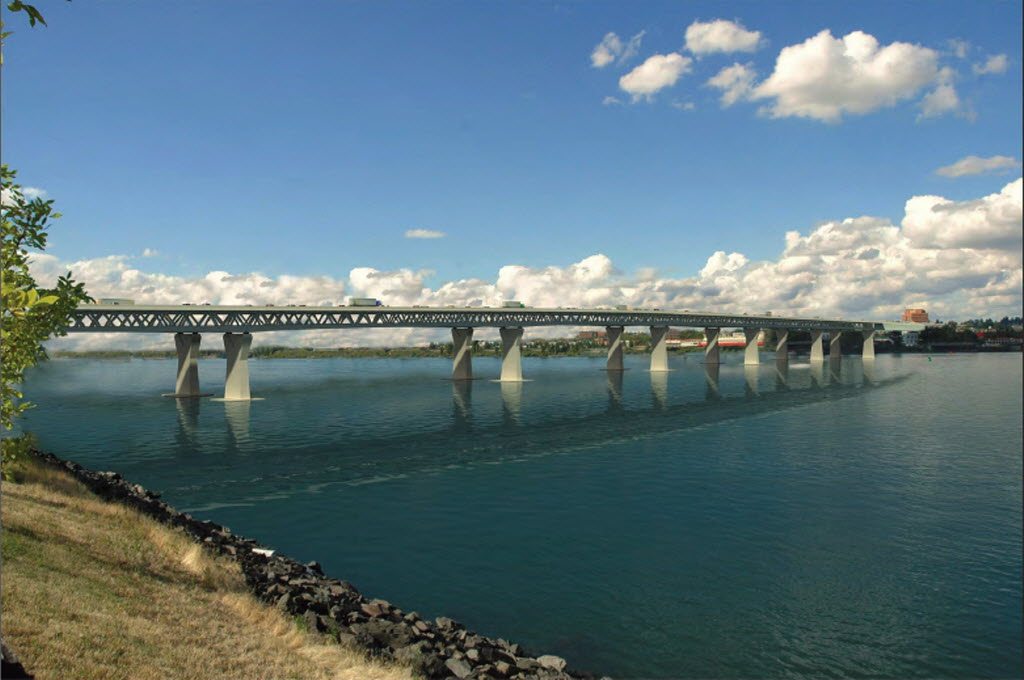The Columbia River Crossing on Tuesday awarded a Washington contractor $4.22 million to start pre-construction testing in two locations beginning early next year.
However, an independent engineering group has also said delays in getting permits to test a third site may hurt the project’s ambitious timeline.
Spokane-based Max J. Kuney Company will test on-land construction techniques for foundations and bridge supports for the replacement bridge over the Columbia River, the project said.
“This work is important because it will help evaluate bridge foundation construction techniques for the replacement bridge across the Columbia River,” Deputy Director Kris Strickler said. “The test project will allow engineers to refine design assumptions and project plans, keeping us on schedule to start construction by the end of 2013.”
Money for the $4.22 million work has already been allotted by the Oregon and Washington departments of transportation and the Federal Interstate Maintenance Discretionary Funds, CRC spokeswoman Mandy Putney said.
Plans include three drilled shafts and a set of five driven piles at two on-land locations: west of the Interstate 5 Bridge near the I-5 and state Highway14 interchange, and near the Hayden Island interchange.
Drilled shafts are deep, cylindrical holes into which concrete is poured to form bridge foundations. Driven piles are long, cylindrical steel columns driven into the soil to provide support for bridges.
Permit rejected
The project had planned for a third location to do test drilling — near Marine Drive. But the Army Corps of Engineers rejected that permit for the work, which is near existing levees.
That denial led the Project Management Oversight Consultant group — an independent group of engineers hired by the U.S. Department of Transportation that evaluates the CRC monthly — to say they have concerns that there’s an increased risk to starting construction on time.
CRC Director Nancy Boyd last week called a late 2013 start time for the
$3.5 billion megaproject “optimistic.” The CRC has spent more than $140 million in planning thus far, at a cost of about $1 million a month.
“It is the PMOC’s opinion that the recent (Army Corps) decision to deny a permit for the drilled shaft test near Marine Drive may have adverse schedule implications for construction of the Columbia River and North Portland Harbor bridges,” the group’s September 2011 report read. “It is the PMOC’s opinion that this development has increased project schedule risk and appears to be affecting completion of the (project).”
An Army Corps of Engineers spokeswoman said Tuesday that the Columbia River Crossing cannot compromise any other existing Corps structure, such as the levees.
“We have to maintain the mission of current federal projects before we let another project come in over it or around it,” spokeswoman Amy Echols said. “The levees protect land behind it. If the Columbia River Crossing comes in and wants to change that levee, we have to make sure the new project doesn’t compromise that.”
Putney, of the CRC, called the September report a “snapshot” of that time, and that the oversight group’s “concerns have been alleviated.”
“Their opinion at the time was that, longer term, there are some challenges or issues to work through with the Army Corps for alternate permits we’ll need for the project,” Putney said. “We have been meeting regularly with Army Corps staff on hand to support the permitting process. My understanding is that they feel the CRC is doing what’s needed to move forward or around the Marine Drive issue.”
Echols said Army Corps staff members have been meeting with the CRC to talk about several complex issues — including the Marine Drive area and the aquatic environment — but did not say if all problems have been resolved. She said her agency is committed to working with the project to resolve issues.
“There are several conversations that need to take place,” Echols said.
Earlier testing
The on-land work set for early 2012 is different than test pilings driven into the river bottom in February.
Six pilings were driven into the river bottom while gauges on the Oregon and Washington sides of the river measured noise and vibrations. The $811,204 test evaluated construction techniques intended to reduce effects on fish and wildlife.
Putney said that in-water and on-land work are different and required two different contracts. The earlier work was connected to work on the environmental impact statement’s biological opinion, she said.
The 2012 test project involves larger holes and is linked to having firm information on where the bridge will need support and also touch down.
Until the federal Record of Decision approving the CRC came through this month, “that information wasn’t confirmed,” she said.
The test project, for which the Max J. Kuney company was the lowest of seven bidders, is expected to be finished by June. Before works starts, area businesses and residents will be notified, and information will be posted on the CRC website.
Andrea Damewood: 360-735-4542 or andrea.damewood@columbian.com or www.facebook.com/reporterdamewood or www.twitter.com/col_cityhall



